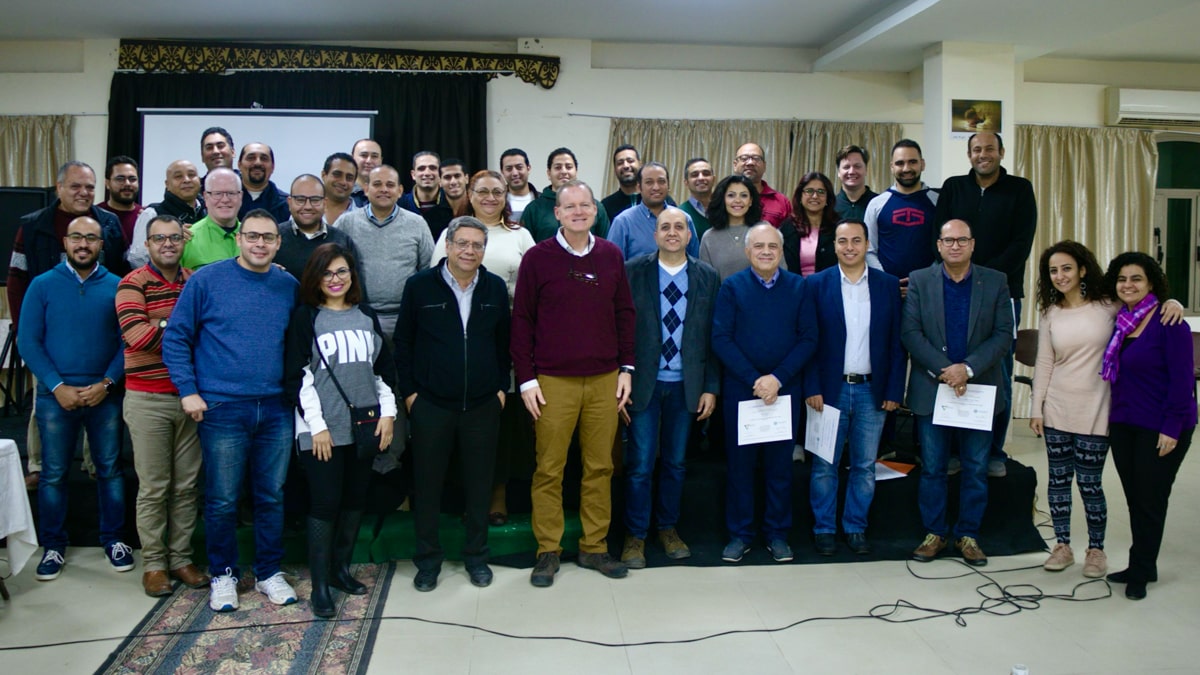
From Challenged to Cultivating a Culture of Giving: SECT, NABLA, Generous Church, and GTP
September 12, 2020
Seven Principles for Helping People Build Thriving Ministries
September 25, 2020Crisis Stewardship and Giving: Six Practical Generosity Insights
During this challenging season, everyone is saying, “What do we do?” The situation forces us to ask deeper, harder questions. This article features six of them related to stewardship and giving. With each one, we explore the example of Paul and his response to the famine in Jerusalem. This process provides six practical insights for helping stewards be generous during COVID-19 and beyond.
1. How much should each person give? Share Your Margin.
Stewards around the world ask this question. Paul offers an international answer. He was sitting in Ephesus and writing the church in Corinth and told them to follow the same directions he gave to the Galatians.
“Now concerning the collection for the saints: you should follow the directions I gave to the churches of Galatia. On the first day of every week, each of you is to put aside and save whatever extra you earn, so that collections need not be taken when I come.” (1 Cor. 16:1-2) (c. A.D. 54)
In a phrase, Paul instructed them to share their margin. Their “extra” would supply someone else’s “not enough.” They were to collect and share it. Paul wanted stewards everywhere to live simply and share promptly.
For some this means you may have to start living on a budget so you know how much you have to share. For others who have a handle on their finances, the issue may be the releasing of the funds. Are you giving according to your means despite the uncertain times?
2. Who should handle the money? Find Credentialed Servants.
Whether you work at a church or ministry and/or give to one, you want trustworthy people administrating the giving. That was Paul’s perspective too, which is why he added this clarification.
“And when I arrive, I will send any whom you approve with letters to take your gift to Jerusalem. If it seems advisable that I should go also, they will accompany me.” (1 Cor. 16:3-4) (c. A.D. 54)
To be “approved with letters” would be to have a credential that qualified a person to handle money. Today this might point to a CPA or Chartered Accountant. Engaging such servants enhances trust and encourages greater giving.
Does the church or ministry where you serve and/or to which you give enlist the paid or volunteer service of such people? To find credentialed servants is extra work and may come at an expense, but the cost of God-honoring administration is always less than the price paid for cutting corners.
3. What is an “acceptable gift” to God? Give What You Have.
The idea of “acceptable giving” can be traced to the earliest biblical history. God saw the heart and the offering of Cain and Abel but only Abel’s was acceptable. Why? Consider this clue.
“By faith Abel brought God a better offering than Cain did. By faith he was commended as righteous, when God spoke well of his offerings. And by faith Abel still speaks, even though he is dead.” (Heb. 11:4)
Many scholars interpret “better offering” as bringing his best to God from a willing heart. This is the same kind of giving Paul describes as acceptable.
“For if the eagerness is there, the gift is acceptable according to what one has—not according to what one does not have.” (2 Cor. 8:12) (c. A.D. 57)
Jesus celebrated when people gave what they had. Consider the boy with “five small barley loaves and two small fish” (John 6:1-13) or the widow with “two small copper coins” (Mark 12:41-44). Neither held back anything. Do we? Acceptable giving is giving all we have willingly to God.
4. Why do standards matter? Preserve God’s Reputation.
Back then and now, people blame each other for everything in a crisis. Just turn on the news. Paul knew this so he outlined collection standards and financial controls to exhibit integrity, to avoid the temptation and opportunity for theft, and to keep the effort above reproach.
“We intend that no one should blame us about this generous gift that we are administering, for we intend to do what is right not only in the Lord’s sight but also in the sight of others.” (2 Cor. 8:20-21) (c. A.D. 57)
The same holds true today. We must preserve God’s reputation by doing more than to avoid breaking laws. We must follow standards, implement controls, keep good records, and submit to independent financial auditors as a testimony to a watching world.
After all, what does God expect of us? Paul would say that he cares as much about our gift administration as he does about our gospel ministry. So, does the church or ministry where you serve and/or to which you give follow Standards of Responsible Stewardship?
5. What does God want to see? Sow Bountifully and Cheerfully.
God watches our giving closely. To be sure the Corinthians understood this, Paul used common agricultural language to teach them.
“The point is this: the one who sows sparingly will also reap sparingly, and the one who sows bountifully will also reap bountifully. Each of you must give as you have made up your mind, not reluctantly or under compulsion, for God loves a cheerful giver.” (2 Cor. 9:6-7) (c. A.D. 54)
How much we reap is up to us. This is not prosperity gospel thinking (giving to get), but rather how participation in the gospel works. In my life, I have found that you don’t figure it out until you live it out. Serving as a conduit of generous blessing is entirely up to us. When we don’t give, we miss out. Thus, Paul urged them (and us) to sow bountifully and cheerfully because God loves it!
The world sees what we give. God looks at what we don’t give cheerfully, and what that says about our hearts. God does not need the money. He wants our hearts, and he loves resourcing cheerful conduits.
6. What if all ministries affixed a seal? Support Trusted Ministries.
Paul spent about six years in the prime of his career orchestrating an international campaign for needy Christians (c. A.D. 53-58). Part of his routine was affixing a seal to verify the integrity of each collection. We learn this from his letter to the Romans written from Corinth.
“Therefore, when I have finished this, and have put my seal on this fruit of theirs, I will go on by way of you to Spain. I know that when I come to you, I will come in the fullness of the blessing of Christ.” (Rom. 15:28-29, NASB) (c. A.D. 58)
COVID may be with us awhile. The economic implications will last far beyond the discovery and distribution of a vaccine. Financial experts say the rich will get richer and the poor will get poorer. So, to whom should we give in crisis?
Support trusted ministries accredited by peer accountability groups like ECFA. Around the world these groups of churches and ministries follow stewardship standards and affix a seal to verify compliance. Give confidently to them knowing the money will get where it is supposed to go. Why? The last thing we need in crisis is a financial scandal!
––––
This article was originally posted on the Christian Leadership Alliance Outcomes Magazine on 10 September 2020. For more insights on this topic, check out the recording of the teaching on “Six New Testament Tips for Stewards to be Generous in Times of Crisis.”
Mayordomía y Ofrendas en Tiempos de Crisis: Seis Ideas Prácticas de Generosidad
Durante esta temporada desafiante, todos se están preguntando “¿qué hacemos?” La situación nos obliga a hacer preguntas más profundas y fuertes. Este artículo presenta seis de ellas relacionadas a la mayordomía y el ofrendar. Con cada una exploramos el ejemplo de Pablo y su respuesta a la hambruna en Jerusalén. Este proceso ofrece seis ideas prácticas para ayudar a los mayordomos a ser generosos durante el COVID-19 y más allá.
1. ¿Qué tanto debería dar cada persona? Comparte de tu margen
Los mayordomos alrededor del mundo se preguntan esto. Pablo ofrece una respuesta internacional. Estaba sentado en Éfeso y escribiendo a la iglesia en Corinto y les dijo que siguieran las mismas instrucciones que le había dado a los gálatas.
“En cuanto a la colecta para los creyentes, sigan las instrucciones que di a las iglesias de Galacia. El primer día de la semana, cada uno de ustedes aparte y guarde algún dinero conforme a sus ingresos, para que no se tengan que hacer colectas cuando yo vaya.” (1 Corintios 16:1-2 NVI) (54 a.C.)
En una frase, Pablo los instruye a que compartan su margen. Su “extra” podría suministrar el “insuficiente” de alguien más. Debían colectar y compartirlo. Pablo quería que los mayordomos de todos lados vivieran de manera simple y que compartieran de inmediato.
Para algunos, esto significa que se debería comenzar a vivir bajo un presupuesto para saber cuánto se debe compartir. Para otros, que tienen un control sobre sus finanzas, el problema puede ser liberar los fondos. ¿Estás dando de acuerdo a tus posibilidades a pesar de que los tiempos son inciertos?
2. ¿Quién debería manejar el dinero? Encuentra servidores con credenciales
Ya sea que trabajes en una iglesia o en un ministerio y/o que ofrendes en uno, quieres personas confiables administrando las ofrendas. Esta también era la perspectiva de Pablo, por lo cual añadió la siguiente aclaración.
“Luego, cuando llegue, daré cartas de presentación a los que ustedes hayan aprobado y los enviaré a Jerusalén con los donativos que hayan recogido. Si conviene que yo también vaya, iremos juntos.” (1 Corintios 16:3-4 NVI) (54 a.C.)
El recibir “cartas de presentación” significaría tener la credencial que calificara a una persona para manejar el dinero. Hoy en día esto podría ser un contador público acreditado o un auditor. El involucrar a estos servidores aumenta la confianza y fomenta una mayor generosidad.
¿La iglesia o ministerio en que sirves y/u ofrendas enlista el servicio pagado o voluntario de tales personas? Encontrar servidores con credenciales es trabajo extra y puede tener un costo, pero el costo de la administración que honra a Dios siempre es menor al precio que se paga al tomar atajos.
3. ¿Qué es una “ofrenda aceptable” para Dios? Ofrenda lo que tienes
La idea de una “ofrenda aceptable” se puede encontrar en la historia más antigua de la Biblia. Dios vio el corazón y la ofrenda de Caín y Abel, pero sólo la de Abel fue aceptable. ¿Por qué? Toma en cuenta lo siguiente.
“Por la fe Abel ofreció a Dios un sacrificio más aceptable que el de Caín, por lo cual recibió testimonio de ser justo, pues Dios aceptó su ofrenda. Y por la fe Abel, a pesar de estar muerto, habla todavía.” (Hebreos 11:4 NVI)
Muchos eruditos interpretan el “más aceptable” como traer lo mejor a Dios desde un corazón dispuesto. Este es el mismo tipo de ofrenda que Pablo describe como aceptable.
“Porque, si uno lo hace de buena voluntad, lo que da es bien recibido según lo que tiene, y no según lo que no tiene.” (2 Corintios 8:12 NVI) (57 a.C.)
Jesús celebraba cuando las personas ofrendaban lo que tenían. Toma en cuenta al niño con “cinco panes de cebada y dos pescados” (Juan 6:1-13 NVI) o a la viuda con “dos moneditas de muy poco valor” (Marcos 12:41-44 NVI). Ninguno retuvo nada. ¿Y nosotros? La ofrenda aceptable es dar voluntariamente todo lo que tenemos.
4. ¿Por qué importan los estándares? Conserva la reputación de Dios.
En ese entonces y ahora, la gente se culpa por todo entre sí en medio de una crisis. Basta con ver las noticias. Pablo sabía esto así que recalcó estándares de colección y controles financieros para exhibir la integridad, para evitar las tentaciones y la oportunidad de robar, y para mantener el esfuerzo por encima de todo reproche.
“Queremos evitar cualquier crítica sobre la forma en que administramos este generoso donativo; porque procuramos hacer lo correcto, no solo delante del Señor, sino también delante de los demás.” (2 Corintios 8:20-21 NVI) (57 a.C.)
Lo mismo es cierto el día de hoy. Debemos conservar la reputación de Dios haciendo más para evitar romper las leyes. Debemos seguir estándares, implementar controles, mantener un buen registro, y someternos a auditores financieros independientes como testimonio ante un mundo que observa.
Después de todo, ¿qué espera Dios de nosotros? Pablo diría que se preocupa tanto de nuestra administración de ofrendas como de nuestro ministerio del evangelio. Así que, ¿la iglesia o ministerio donde sirves y/o al que ofrendas sigue los Estándares de una Mayordomía Responsable?
5. ¿Qué es lo que quiere ver Dios? Siembra abundante y alegremente.
Dios observa de cerca nuestro dar. Para asegurarse de que los corintios entendían esto, Pablo usó lenguaje común de agricultura para enseñarles.
“Recuerden esto: El que siembra escasamente, escasamente cosechará, y el que siembra en abundancia, en abundancia cosechará. Cada uno debe dar según lo que haya decidido en su corazón, no de mala gana ni por obligación, porque Dios ama al que da con alegría.” (2 Corintios 9:6-7 NVI) (54 a.C.)
Cuánto cosechar depende de nosotros. Esto no es parte del pensamiento del evangelio de prosperidad (dar para recibir), sino es cómo funciona la participación en el evangelio. En mi vida, descubrí que no lo entiendes hasta que lo vives. Servir como un conducto de bendición generosa depende totalmente de nosotros. Cuando no damos, perdemos. De este modo, Pablo los insta (y a nosotros) a sembrar abundante y alegremente ¡porque a Dios le encanta!
El mundo ve lo que damos. Dios ve lo que damos sin alegría, y lo que eso dice de nuestros corazones. Dios no necesita el dinero. Él quiere nuestros corazones y le encanta encontrar conductos alegres.
6. ¿Qué pasaría si todos los ministerios colocaran un sello? Apoya a los ministerios de confianza.
Pablo pasó casi 6 años en lo mejor de su carrera orquestando una campaña internacional para los cristianos necesitados (53-58 a.C.). Parte de su rutina era colocar un sello para verificar la integridad de cada colección. Aprendemos esto en su carta a los romanos escrita desde Corinto.
“Así que, una vez que yo haya cumplido esta tarea y entregado en sus manos este fruto, saldré para España y de paso los visitaré a ustedes. Sé que, cuando los visite, iré con la abundante bendición de Cristo.” (Romanos 15:28-29 NVI) (58 a.C.)
El COVID puede quedarse con nosotros por un tiempo. Las consecuencias económicas van a durar mucho más allá del descubrimiento y distribución de una vacuna. Los expertos financieros dicen que los ricos serán más ricos y los pobres más pobres. Así que ¿a quién debemos de dar en una crisis?
Apoya a los ministerios de confianza acreditados por grupos de rendición de cuentas como el Consejo Evangélico de Responsabilidad Financiera (ECFA, por sus siglas en inglés). Alrededor del mundo,estos grupos de iglesias y misterios siguen estándares de mayordomía y colocan un sello para verificar el cumplimiento. Ofréndales confiadamente sabiendo que el dinero llegará a donde se supone que debe ir. ¿Por qué? ¡Lo último que necesitamos en una crisis financiera es un escándalo!
––––
Este artículo fue publicado originalmente en Christian Leadership Alliance Outcomes Magazine el 10 de septiembre de 2020. Para más información de este tema, mira la grabación de la enseñanza sobre “6 Consejos del Nuevo Testamento para que los Mayordomos sean Generosos en Tiempo de Crisis.”




